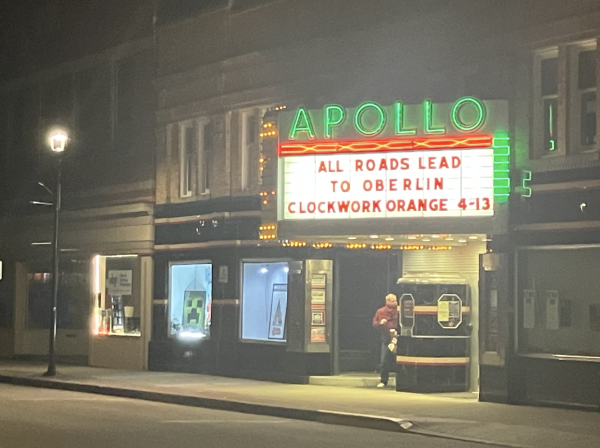On the Record with Jennifer Blaylock, Mellon Postdoctoral Fellow

Jennifer Blaylock
Jennifer Blaylock is a Mellon Postdoctoral Fellow and visiting assistant professor of Cinema Studies. Her academic work and research span the fields of media technology, audio-visual archives, postcolonial and decolonial theory, and African studies. She has published a wide array of articles in various media and cinema studies publications, and she is currently working on a book manuscript titled: Making Media New: Race in African Media History. Drawing particularly from her 2021 article, “‘Who wants a BlackBerry these days?’ Serialized new media and its trash,” Blaylock reflects on relationships between “new media” marketing, seriality, and anti-colonial media counter movements within the African continent.
This interview has been edited for length and clarity.
Could you tell me a little about your background? What drew you to interrogate the intersections between fields that may seem disparate but, as your research shows, comprise a fuller picture of societal phenomena such as racial capitalism?
I can talk more specifically about the origin of BlackBerry Babes, and maybe it’ll explain some of the other stuff. The article came out of work that I was doing as a graduate student at UC Berkeley when I was getting my PhD. I was studying with a professor named Linda Williams, who was just finishing her book On The Wire and was focused on this concept of seriality. A lot of scholars at the time were interested in how the serial was taken up by primetime television, in how popular critics were talking about The Wire in relation to Charles Dickens. Williams was interested in how this form of literature, that had to do with serial from an earlier period, was being compared to these prestige television shows. She taught a class on serials, and later did a conference on the concept of serial where she invited scholars and graduate students from all over to apply.
I had been doing work in African cinema, thinking particularly about Nollywood film. It just wasn’t really talked about in the department at UC Berkeley, and there wasn’t a lot of knowledge about the form. In the 2000s and 2010s, Nollywood film — Nigerian cinema — and also Guinean cinema and West African cinema practices, were created in this serialized form. So I had the idea to take this concept of seriality and think about it in the context of particularly Nigerian cinematic practices and see what happens. I applied for Williams’ conference and didn’t get in, but I still decided to write the paper anyway. That’s sort of the origin of it. I was interested in this particular film, BlackBerry Babes, because I saw this relationship between the phones and the film. Regarding your article on BlackBerry Babes, I was struck by your definitions of the term “new media” and how it serves to calcify and perpetuate societal binaries.
Could you speak on this and on the contexts and research that lead you to this definition?
I think the term that scholars are using instead of new media is digital media, but for a time it was new media, when they were talking about computing and other forms of moving images in the digital realm. A lot of historians pushed back on this idea of new and were really interested in interrogating, “Okay, well, what does it mean to be new media, and how are things that we’re qualifying as new actually drawing on longer histories?” There was a suspicion of that emphasis on “new,” I think particularly because of its relationship to marketing. You gotta get the new one, the new technology, the best technology. A lot of media historians were interrogating that relationship between marketing — not only as a marketing device, but the way the “new” also perpetuated ideas that the next media technology was the best or better. Historians of media tried to interrogate the idea that there’s progress, that just because it’s new doesn’t mean it’s necessarily creating a better society or making things more
convenient. One of the things that I tried to do in the article was subtly push on the way academics are also invested in newness when they come up with theories. I was trying to point out how that’s also our way of selling and perpetuating ideas — particularly in concepts of time — which is part of classifying locations and spaces.
In your course “Theory and History of Global Cinema,” you interrogate the ways in which cinema can foster a kind of global solidarity. Could you expand a bit on this theory, as well as the aims and scope of that course in general?
That course is a lot, because it’s the whole history of cinema — over a hundred years — and then also history and theory, and it is global. I take an approach to the history of cinema, which is basically that cinema from the beginning is a global enterprise. It’s a global process. A lot of scholars have linked cinema to modernity — the concept of modernity arising from the 1800s to the 1900s when cinema was sort of born. Cinema is emblematic of these rapid changes in industrialization and urbanization. Throughout the course, we think about the relationship between the global North and the global South, but we also look between countries across the global South and how strategies of filmmaking and aesthetics can be revolutionary and were shared for anti-colonial, anti-imperial, and anti-neocolonial projects.
Could you talk a little bit about your upcoming projects — the book and articles you’re currently working on?
The book project is coming out of my dissertation; the BlackBerry Babes is the last chapter of the book. The book takes a look at different media technologies when they are “new” to the African continent and kind of interrogates discourses about these technologies. I start with gramophones, and I move through radio, cinema, television, and mobile phones. I take a postcolonial approach to seeing the continuities of discourses that began in a colonial period and how they continue into international discourse — the relationship between cinema for colonial development projects and how that has resonances with later approaches to media technologies. I also do work to show the legacies of these colonial — and by colonial I also mean white supremacist — ways of talking about technology. I try to show how Africans were also countering that discourse through new media use. That particularly comes out in a discussion of Ghana television. The first director of Ghana television was Shirley Graham Du Bois, OC ’34, which is pretty cool. She was a very strong Pan-Africanist, like her husband W.E.B. Dubois, and a socialist. As a director, she was really radically trying to think about how the new medium of television in Ghana could breakdown the way that new technologies had been synonymous with capitalist forms of consumption. She was really interested in how to make this new technology work for Pan-African Black liberation. So I use that history to sort of counter the way legacies of a colonial discourse happen.








